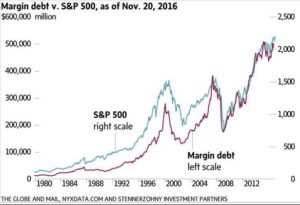Margin is a double edged sword. Your gains are magnified when the value of the related assets rise. Losses, however, are magnified when they decline. One of the items I touched upon in my recent “Stock Valuations are Too High. I Would Exercise Caution.” post, was the risk of Trump’s economic stimulus plans. Should he follow through with his intentions the US may experience rapid economic growth which could translate into aggressive interest rate hikes.
This is exceptionally worrisome in that investors, particularly in the US, have taken on considerable margin debt the last few years.
When you employ leverage you create vulnerability. What would happen if we experienced a sudden sharp rise in interest rates, disappointing economic data or perhaps a negative political event (eg. U.S. trade war with China, or increased Russian belligerence)?
There are a host of potential events which could occur but which investors appear to be overlooking or downplaying. In essence, when times are good people forget what can happen when the music stops playing. Greed tends to set in.
Warren Buffett said it best when he stated:
“Two super-contagious diseases, fear and greed, will forever occur in the investment community. The timing of these epidemics will be unpredictable. … We simply attempt to be fearful when others are greedy and to be greedy only when others are fearful.”
Investors continually deal with uncertainty but the greater the level of margin employed, the weaker the ability to “wait out” any shock. Some investors when faced with a margin call:
- suddenly realize their risk tolerance level is dramatically lower when the market “corrects”;
- encounter the predicament where their ability to come up with the required funds to meet margin calls is much weaker than originally anticipated.
You could receive margin calls if your investments are caught in a downdraft. Once you are unable to meet these margin calls, you are forced to sell your investments at depressed levels.
Essentially, the intensity of selling pressure is compounded by the length and severity of a market downturn. What might initially start as a slight decline can quickly become a very steep decline!
In my opinion, now is an appropriate time to adopt a cautionary approach. You may wish to:
- trim speculative positions
- reduce margin debt
- accumulate cash
- check, recheck, and recheck your analysis before investing new money
- sell holdings that have increased in value (a bird in the hand is better than two in the bush)
Countless investors employing margin debt when the dot.com bubble burst and when the Financial Crisis hit were decimated. Don’t let this happen to you when we experience the next major market correction.


